
Fyodor Mikhailovich Dostoevsky, sometimes transliterated as Dostoyevsky, was a Russian novelist, short story writer, essayist and journalist. Numerous literary critics regard him as one of the greatest novelists in all of world literature, as many of his works are considered highly influential masterpieces. Dostoevsky's literary works explore the human condition in the troubled political, social, and spiritual atmospheres of 19th-century Russia, and engage with a variety of philosophical and religious themes. His most acclaimed novels include Crime and Punishment (1866), The Idiot (1869), Demons (1872), and The Brothers Karamazov (1880). His 1864 novella Notes from Underground is considered to be one of the first works of existentialist literature.
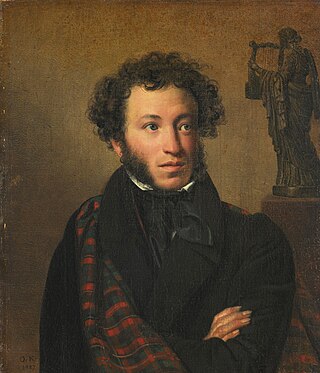
Alexander Sergeyevich Pushkin was a Russian poet, playwright, and novelist of the Romantic era. He is considered by many to be the greatest Russian poet, as well as the founder of modern Russian literature.

Russian literature refers to the literature of Russia, its émigrés, and to Russian-language literature. Major contributors to Russian literature, as well as English for instance, are authors of different ethnic origins, including bilingual writers, such as Kyrgyz novelist Chinghiz Aitmatov. At the same time, Russian-language literature does not include works by authors from the Russian Federation who write exclusively or primarily in the native languages of the indigenous non-Russian ethnic groups in Russia, thus the famous Dagestani poet Rasul Gamzatov is omitted.

Ivan Sergeyevich Turgenev was a Russian novelist, short story writer, poet, playwright, translator and popularizer of Russian literature in the West.
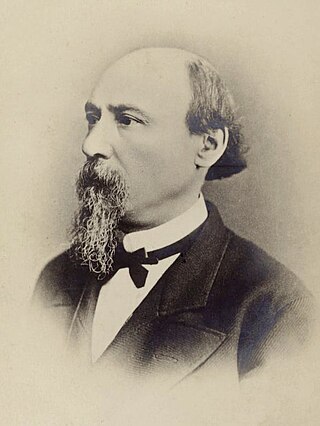
Nikolay Alexeyevich Nekrasov was a Russian poet, writer, critic and publisher, whose deeply compassionate poems about the Russian peasantry made him a hero of liberal and radical circles in the Russian intelligentsia of the mid-nineteenth century, particularly as represented by Vissarion Belinsky and Nikolay Chernyshevsky. He is credited with introducing into Russian poetry ternary meters and the technique of dramatic monologue. As the editor of several literary journals, notably Sovremennik, Nekrasov was also singularly successful and influential.

The Brothers Karamazov, also translated as The Karamazov Brothers, is the last novel by Russian author Fyodor Dostoevsky. Dostoevsky spent nearly two years writing The Brothers Karamazov, which was published as a serial in The Russian Messenger from January 1879 to November 1880. Dostoevsky died less than four months after its publication. It has been acclaimed as one of the supreme achievements in world literature.

Constance Clara Garnett was an English translator of nineteenth-century Russian literature. She was the first English translator to render numerous volumes of Anton Chekhov's work into English and the first to translate almost all of Fyodor Dostoevsky's fiction into English. She also rendered works by Ivan Turgenev, Leo Tolstoy, Nikolai Gogol, Ivan Goncharov, Alexander Ostrovsky, and Alexander Herzen into English. Altogether, she translated 71 volumes of Russian literature, many of which are still in print today.

Yevgeny Abramovich Baratynsky was lauded by Alexander Pushkin as the finest Russian elegiac poet. After a long period when his reputation was on the wane, Baratynsky was rediscovered by Russian Symbolism poets as a supreme poet of thought.

Vasily Andreyevich Zhukovsky was the foremost Russian poet of the 1810s and a leading figure in Russian literature in the first half of the 19th century. He held a high position at the Romanov court as tutor to the Grand Duchess Alexandra Feodorovna and later to her son, the future Tsar-Liberator Alexander II.

Georgy Ivanovich Chulkov was a Russian Symbolist poet, editor, writer and critic. In 1906 he created and popularized the theory of Mystical Anarchism.

David Magarshack was a British translator and biographer of Russian authors, best remembered for his translations of Dostoevsky and Nikolai Gogol.

Apollinaria Prokofyevna Suslova, commonly known as Polina Suslova, was a Russian short story writer, who is perhaps best known as a mistress of writer Fyodor Dostoyevsky, wife of Vasily Rozanov and a sister of Russia's first female physician Nadezhda Suslova. She is considered to be the prototype of several female characters in Dostoyevsky's novels, such as Polina in The Gambler, Nastasya Filipovna in The Idiot, Katerina Ivanovna Marmeladova in Crime and Punishment, Lizaveta Nikolaevna in The Possessed, and both Katerina and Grushenka in The Brothers Karamazov. Suslova has often been portrayed as a femme fatale. Fyodor Dostoyevsky called her one of the most remarkable women of his time.
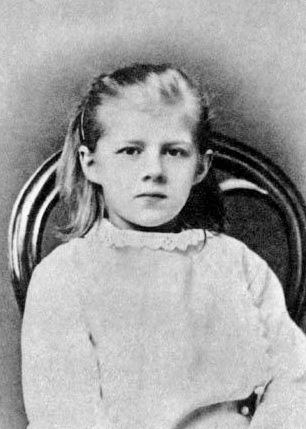
Lyubov Fyodorovna Dostoevskaya, also known by the name Aimée Dostoyevskaya, was a Russian writer and memoirist.
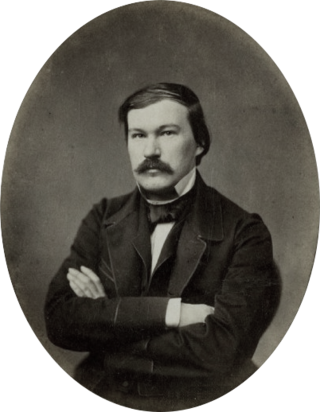
Alexander Vasilyevich Druzhinin, , was a Russian writer, translator, and magazine editor.

Lidia Ivanovna Veselitskaya, March 17, 1857 – February 23, 1936) was a Russian novelist, short story writer, memoirist, and translator who used the pseudonyms V. Mikulich and L. Chernavina.
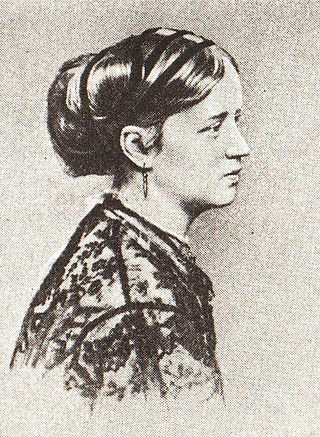
Anne Jaclard, born Anna Vasilyevna Korvin-Krukovskaya (1843–1887), was a Russian socialist and feminist revolutionary. She participated in the Paris Commune and the First International and was a friend of Karl Marx. She was once courted by Fyodor Dostoyevsky, who published two of her stories in his journal. Her sister was the mathematician and socialist Sofia Kovalevskaya (1850–1891).

The themes in the writings of Russian writer Fyodor Dostoevsky, which consist of novels, novellas, short stories, essays, epistolary novels, poetry, spy fiction and suspense, include suicide, poverty, human manipulation, and morality. Dostoevsky was deeply Eastern Orthodox and religious themes are found throughout his works, especially in those written after his release from prison in 1854. His early works emphasised realism and naturalism, as well as social issues such as the differences between the poor and the rich. Elements of gothic fiction, romanticism, and satire can be found in his writings. Dostoyevsky was "an explorer of ideas", greatly affected by the sociopolitical events which occurred during his lifetime. After his release from prison his writing style moved away from what Apollon Grigoryev called the "sentimental naturalism" of his earlier works and became more concerned with the dramatization of psychological and philosophical themes.

Poor Folk, sometimes translated as Poor People, is the first novel by Fyodor Dostoevsky, written over the span of nine months between 1844 and 1845. Dostoevsky was in financial difficulty because of his extravagant lifestyle and his developing gambling addiction; although he had produced some translations of foreign novels, they had little success, and he decided to write a novel of his own to try to raise funds.

The Landlady is a novella by Russian author Fyodor Dostoevsky, written in 1847. Set in Saint Petersburg, it tells of an abstracted young man, Vasily Mikhailovich Ordynov, and his obsessive love for Katerina, the wife of a dismal husband whom Ordynov perceives as a malignant fortune-teller or mystic. The story has echoes of Russian folklore and may contain autobiographical references. In its time The Landlady had a mixed reception, more recently being seen as perhaps unique in Dostoevsky's oeuvre. The first part of the novella was published in October 1847 in Notes of the Fatherland, the second part in November that year.

The bibliography of Fyodor Dostoyevsky (1821–1881) comprises novels, novellas, short stories, essays and other literary works. Raised by a literate family, Dostoyevsky discovered literature at an early age, beginning when his mother introduced the Bible to him. Nannies near the hospitals—in the grounds of which he was raised—introduced Dostoyevsky to fairy tales, legends and sagas. His mother's subscription to the Library of Reading gave him access to the leading contemporary Russian and non-Russian literature. After his mother's death, Dostoyevsky moved from a boarding school to a military academy and despite the resulting lack of money, he was captivated by literature until his death.


















